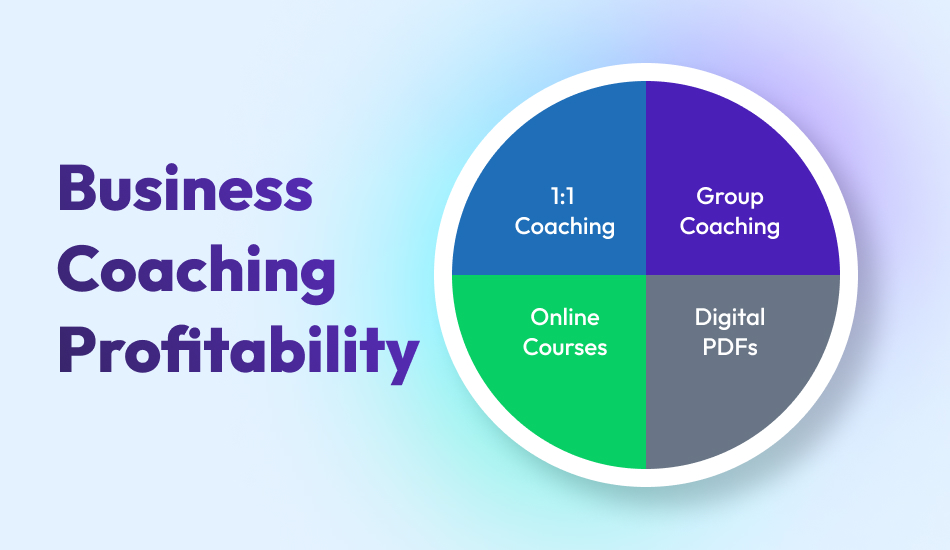As a business coach, your role is to guide entrepreneurs, small business owners, or executives toward achieving their business goals.
Whether you specialize in helping startups grow or assist established companies in improving their operations, running a business coaching practice can be both fulfilling and highly profitable. But what does it take to build a successful business coaching practice? And why does online coaching offer a unique opportunity to scale and increase your revenue? Keep reading to find out!
Understanding the Basics of a Business Coaching Practice
A business coaching practice focuses on providing strategic advice and support to clients looking to overcome challenges, improve performance, and achieve sustainable growth. As a business coach, you offer expertise in areas such as:
- Leadership skills
- Marketing expertise
- Financial management
- Overall business strategy
Great news! The demand for business coaching keeps growing. More entrepreneurs than ever before are seeking guidance to navigate today’s complex business landscape. In fact, the business coaching industry has increased from $3 billion in 2012 to over $14 billion in 2024!
Whether you offer one-on-one coaching or group coaching programs, you have the opportunity to make a significant impact on your clients’ success while building a profitable business coaching practice.
The Profitability of Online Business Coaching
The shift toward online coaching has opened up new opportunities for business coaches. Thanks to the internet, you can reach new business owners and entrepreneurs from around the world.
This global reach expands your client base and increases your earning potential, allowing you to scale your business coaching practice beyond traditional in-person coaching models.
Additionally, creating digital products like online courses and templates allows you to generate passive income. For example, you can develop a course on “Effective Copywriting Strategies” and sell it to a wide audience. This way, your expertise continues to generate revenue even when you’re not actively working with clients.
By offering a combination of business coaching programs and digital products, you can build a profitable coaching business that meets the growing demand for business expertise.

Step-by-Step Guide to Starting a Profitable Business Coaching Practice
Building a business coaching practice requires more than just knowledge and expertise—it demands a strategic approach to establishing yourself in the market and attracting the right clients. From selecting your niche to creating a scalable coaching program, these steps will set you on the path to long-term success.
Choose Your Business Coaching Niche and Define Your Ideal Clients
One of the key steps in building a profitable business coaching practice is selecting a well-defined niche. Instead of casting a wide net, focusing on a specific area of expertise helps you stand out in a saturated business coaching market and enables you to deliver more personalized and impactful advice.
Whether it’s leadership development, financial management, or another area, specializing in a niche allows you to address specific client challenges with precision.
By narrowing your focus, you can sharpen your messaging and services to resonate with the exact audience you want to attract. This creates a stronger connection with potential clients who are actively seeking solutions in your area of expertise, positioning you as the go-to expert in that niche and letting you charge a premium for your expertise.
For example, you might specialize in helping small business owners scale their operations or focus on coaching entrepreneurs who are launching startups.
When you niche down, your ideal clients feel as though your coaching programs or services were designed specifically for them, addressing their exact challenges and goals. This personalized approach makes it easier to create targeted coaching programs that speak directly to their pain points and offer tailored solutions, ultimately leading to greater client success and measurable business growth.

Defining your niche allows you to refine your messaging and attract clients who are a perfect fit for your expertise.
Create a Business Coaching Program or Package
Once you’ve identified your niche, the next step is to design a structured coaching program that delivers real value to your clients. Whether you offer one-on-one coaching or group coaching programs, your business coaching package should provide a clear roadmap to success.
For example, you could create a 12-week program that helps clients develop a strategic plan to increase their revenue, or a six-month package focused on improving leadership skills for business owners.
Offering tiered coaching packages is also an effective way to serve different levels of clients. For instance, you could offer a basic package for newer business owners and a premium package for more established entrepreneurs looking for advanced strategies. This allows you to cater to a wider range of clients while maximizing your earning potential.
Another benefit: your coaching packages pricing can set your business up for recurring revenue, an essential aspect of a stable business.
Building Your Coaching Skills and Certifications
As a business coach, your expertise is your most valuable asset. While you may not need formal certifications to be successful, continuing to develop your coaching skills will enhance your credibility and ability to serve clients.
Attending industry conferences, taking advanced business courses, and staying updated on the latest business coaching trends can keep you competitive and increase your value in the eyes of potential clients.
Additionally, gathering client testimonials is the most powerful way to build trust and credibility. As you work with more clients, ask them for feedback and showcase their success stories on your website or social media platforms. Positive reviews from satisfied clients highlight your expertise and inspire future clients to envision themselves achieving that same level of success. Seeing real-world examples of others who have transformed their businesses through your coaching can make a significant difference in attracting new clients to your coaching business.
How to Attract Clients and Grow Your Business Coaching Practice
Now that you chose your business niche, it’s time to find clients in that niche.
As a business coach, you need to use targeted strategies to connect with potential clients and demonstrate the value of your coaching services. Let’s dive into how to build a strong online presence, leverage email marketing, and use content marketing to grow your business coaching practice.
Develop a Solid Online Presence
In today’s digital world, your online presence is one of the most powerful tools for attracting business coaching clients. Start by creating a professional website that clearly outlines your coaching services, showcases your expertise, and highlights client success stories through testimonials. Make sure your website has an easy way for potential clients to book a discovery call or sign up for a coaching program. Here are some examples of coaching websites to help you get started.
Beyond your website, it’s important to be active on social media platforms where your ideal clients spend their time.
While LinkedIn is especially effective for business coaches working with executives and corporate clients, other platforms can be just as impactful, depending on your target audience. Instagram is great for coaches offering services to other coaches, small business owners, freelancers, or entrepreneurs, for instance. It allows for more personal engagement and creative content sharing.
Regularly posting business tips, industry insights, or case studies across platforms like LinkedIn, Instagram, and even Facebook can help you establish authority and connect with your ideal clients.
Tailor your platform usage based on where your audience is most active—corporate professionals on LinkedIn, freelancers and creatives on Instagram, or local businesses on Facebook.

Use Email Marketing to Build Relationships with Clients
Email marketing is one of the most cost-effective ways to nurture leads and maintain relationships with potential clients. By building an email list, you can stay connected with people who are interested in your business coaching services. Offering a valuable piece of free content (a “lead magnet”) such as a free eBook, checklist, or webinar, helps encourage website visitors to subscribe to your emails.
Once you have their contact information, send them a series of emails that provide actionable business tips, share success stories, and invite them to book a consultation.
The key is to consistently provide value while gently guiding your leads toward signing up for your coaching program. Include clear calls-to-action in every email, whether it’s to schedule a free strategy session or join one of your group coaching programs.
Content Marketing Strategies to Reach Your Audience
As a business coach, content marketing can position you as an expert and attract more coaching clients. Regularly publishing blog posts, podcasts, and webinars is a great way to demonstrate your expertise and provide value to business owners who are looking for guidance.
For example, you could create a blog post on “How to 10X Your Revenue” or host a webinar on “Effective Leadership Strategies for Growing Businesses.” Sharing this content on your social media platforms and through your email list will drive engagement and encourage potential clients to take action.
Looking into partnerships where you can guest blog or be a guest on someone else’s podcast is another great way to expand your reach and achieve more referrals.
By consistently producing high-quality content, you’ll build trust with your audience, which can ultimately lead to more clients for your business coaching practice.
Creating Multiple Income Streams in Your Business Coaching Practice
To build a sustainable and profitable business coaching practice, relying on just one source of income isn’t enough. Diversifying your income streams by offering additional products and services allows you to maximize your revenue while meeting the various needs of your clients.
From online courses to group coaching programs, these strategies will help you create passive income and scale your business. Let’s explore how to generate multiple income streams as a business coach.
Offering Online Courses as Passive Income
One of the best ways to create passive income is by developing and selling online courses. As a business coach, you have valuable knowledge that can help business owners and entrepreneurs overcome challenges and grow their businesses. By packaging this expertise into an online course, you can reach a much larger audience than with one-on-one coaching. And your customers can learn at their own pace.
If you need help in how to create an online course, some ideas could be creating a course on “Scaling a Business to Six Figures.” Once the course is created, you can sell it repeatedly without having to invest more time in delivering the content.
This allows you to continue earning revenue while focusing on other aspects of your coaching practice.
Selling Digital Products and Templates
In addition to online courses, offering digital products such as templates, workbooks, and guides can provide another revenue stream for your business coaching practice. These products can offer clients practical tools that complement your coaching sessions. For example, you could sell a “Business Planning Template” for small business owners or a “Sales Strategy Workbook” for startups looking to grow.
The benefit of digital products is that, just like online courses, they are scalable. Once created, you can sell them on autopilot. This makes them an excellent way to add passive income to your business.
Adding Group Coaching Programs to Your Business Model
Group coaching programs are another highly effective way to scale your business coaching practice. Unlike one-on-one coaching, group coaching allows you to serve multiple clients at once, increasing your impact and your income without a significant increase in time spent. These programs can be structured around specific business goals, such as “Growing Your Business from Startup to Scale” or “How to Run a Business Organically.”

Not only do group coaching programs allow you to reach more people, but they also create a collaborative environment where participants can learn from each other’s experiences.
This adds additional value to your program and helps build a sense of community among your clients. Pricing your group coaching competitively makes it an attractive option for business owners who are looking for more affordable coaching services but still want expert guidance.
Building a Full-Time, Successful Business Coaching Practice
Transforming your business coaching practice from a part-time endeavor into a full-time, sustainable career requires a well-thought-out strategy.
To ensure long-term success, you need to scale your operations, manage your time effectively, and create a reliable income stream that supports your transition to full-time business coaching. Here are some tips to take your business to the next level.
Scaling Your Business with Automation
Automation is one of the most powerful tools for scaling a business coaching practice. By automating routine tasks such as client onboarding, scheduling coaching sessions, and sending follow-up emails, you can save time and focus on delivering value to your clients.
Also, automating lead generation and email marketing allows you to consistently engage with potential clients and guide them through your sales funnel, turning them into paying customers.
You can create automated email sequences that nurture leads, promote your coaching programs, and invite subscribers to book discovery calls. This consistent flow of communication can help increase client acquisition and retention, all while freeing up your time.
Managing Your Time and Resources
As your business coaching practice grows, managing your time effectively becomes even more important. Start by setting boundaries around your schedule. Dedicate specific time blocks for coaching sessions, content creation, and client acquisition, while also ensuring you have time for personal development and rest.
If you find yourself bogged down with administrative tasks, consider outsourcing certain aspects of your business, such as social media management or bookkeeping. This allows you to focus on the higher-level activities that drive growth in your coaching practice, such as developing coaching programs and improving client relationships.
Moving from Part-Time to Full-Time Coaching
For many business coaches, the goal is to transition from part-time to full-time coaching. To make this leap, it’s helpful to have consistent income streams in place, whether through one-on-one coaching, group coaching programs, or digital products.
One effective way to ensure steady income is by securing a few clients on a monthly retainer package. This model provides recurring revenue and makes the transition to full-time coaching smoother since you’ll have consistent income each month.
Establish a financial plan that outlines how much revenue you need to generate to support a full-time lifestyle, and track your progress toward that goal. Before making the shift, consider setting milestones for client acquisition and revenue growth.
For instance, you may decide to move into full-time coaching once you’ve secured a certain number of retainer clients or built enough passive income from your online courses. With a solid plan and consistent income in place, you’ll have the confidence and stability to take your business to the next level.

Final Thoughts: Growing a Profitable Business Coaching Practice
Building a successful business coaching practice takes time, effort, and a commitment to continuous growth. To thrive in the business coaching industry, you need to focus on delivering value to your clients, staying consistent with your marketing efforts, and investing in your own professional development.
By consistently delivering value, staying committed to your marketing strategies, and investing in your own growth, you can build a profitable business coaching practice that thrives in the long term. These strategies will not only help you attract more clients but also ensure that your own business continues to grow and evolve in the competitive business coaching industry.
Want to see how easy it is to grow your coaching business with Kartra? Get started today and experience it for yourself.


